-
 Bitcoin
Bitcoin $101,730.5414
-2.70% -
 Ethereum
Ethereum $2,454.6799
-2.55% -
 Tether USDt
Tether USDt $1.0000
-0.02% -
 XRP
XRP $2.4821
4.61% -
 BNB
BNB $657.8495
0.61% -
 Solana
Solana $170.2739
-1.66% -
 USDC
USDC $0.9998
-0.01% -
 Dogecoin
Dogecoin $0.2259
-2.53% -
 Cardano
Cardano $0.8000
-1.49% -
 TRON
TRON $0.2720
2.89% -
 Sui
Sui $3.8978
-2.73% -
 Chainlink
Chainlink $16.4135
-3.46% -
 Avalanche
Avalanche $24.3873
-1.68% -
 Stellar
Stellar $0.3078
0.12% -
 Shiba Inu
Shiba Inu $0.0...01538
-3.80% -
 Hedera
Hedera $0.2113
2.90% -
 Toncoin
Toncoin $3.3163
-1.73% -
 Bitcoin Cash
Bitcoin Cash $406.7742
-0.94% -
 Hyperliquid
Hyperliquid $24.0023
-2.39% -
 Polkadot
Polkadot $5.0218
-2.11% -
 UNUS SED LEO
UNUS SED LEO $8.4943
1.49% -
 Pi
Pi $1.1016
1.30% -
 Litecoin
Litecoin $100.8299
0.36% -
 Monero
Monero $335.7882
-0.16% -
 Pepe
Pepe $0.0...01329
-2.77% -
 Bitget Token
Bitget Token $4.7432
-2.62% -
 Dai
Dai $1.0000
0.01% -
 Ethena USDe
Ethena USDe $1.0009
0.05% -
 Uniswap
Uniswap $6.8219
-1.56% -
 Bittensor
Bittensor $452.7810
-0.39%
How to protect the Bitcoin wallet address? Practical anti-hacking tips
Protect your Bitcoin wallet address with hardware wallets, strong passphrases, 2FA, software updates, cold storage, and vigilance against phishing and social engineering attacks.
May 13, 2025 at 01:00 am
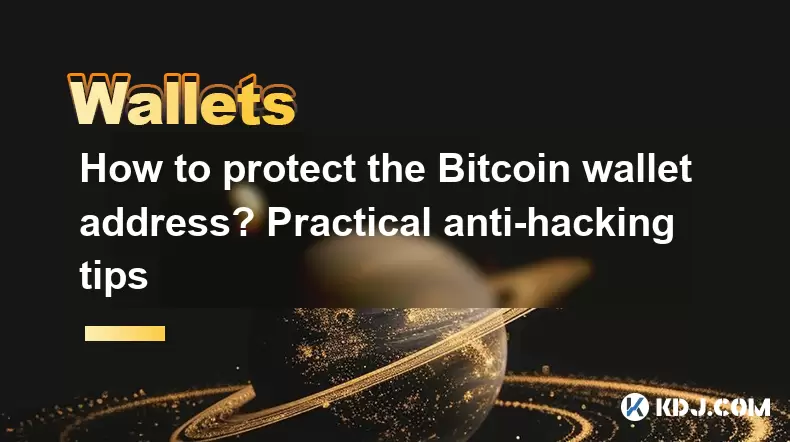
Protecting your Bitcoin wallet address is crucial in safeguarding your digital assets from potential hackers and malicious actors. Bitcoin, as a decentralized digital currency, relies heavily on the security measures implemented by its users. By understanding and applying practical anti-hacking tips, you can significantly reduce the risk of losing your funds. This article will delve into various strategies and best practices to help you protect your Bitcoin wallet address effectively.
Understanding Bitcoin Wallet Security
Before diving into the specific tips for securing your Bitcoin wallet address, it's essential to understand the basics of Bitcoin wallet security. A Bitcoin wallet address is essentially a public key that allows others to send you Bitcoin. However, the corresponding private key, which you must keep secret, is what grants access to the funds associated with that address. The security of your Bitcoin wallet hinges on the protection of your private key.
Use Hardware Wallets
One of the most effective ways to protect your Bitcoin wallet address is by using a hardware wallet. Hardware wallets are physical devices designed to store your private keys offline, making them immune to online hacking attempts. Hardware wallets provide an additional layer of security by keeping your private keys isolated from internet-connected devices.
- Choose a reputable hardware wallet brand such as Ledger or Trezor.
- Purchase the hardware wallet from an official source or authorized reseller to avoid tampered devices.
- Follow the manufacturer's instructions to set up the hardware wallet and generate a new wallet address.
- Store your hardware wallet in a secure location, such as a safe or a locked drawer, when not in use.
- Regularly update the firmware of your hardware wallet to ensure you have the latest security patches.
Implement Strong Passphrases
Using strong passphrases is another critical aspect of protecting your Bitcoin wallet address. A passphrase adds an extra layer of security to your wallet, making it more difficult for hackers to access your funds even if they manage to obtain your private key. A strong passphrase should be long, unique, and include a mix of letters, numbers, and special characters.
- Avoid using easily guessable information such as birthdays, names, or common words.
- Use a passphrase generator to create a random and complex passphrase.
- Write down your passphrase and store it in a secure location, such as a safe deposit box.
- Never share your passphrase with anyone, and be cautious of phishing attempts that try to trick you into revealing it.
Enable Two-Factor Authentication (2FA)
Two-factor authentication (2FA) adds an additional layer of security to your Bitcoin wallet by requiring a second form of verification before allowing access. Enabling 2FA can significantly reduce the risk of unauthorized access to your wallet, even if your password or passphrase is compromised.
- Choose a reliable 2FA method, such as an authenticator app (e.g., Google Authenticator, Authy) or a hardware token.
- Set up 2FA on your Bitcoin wallet according to the provider's instructions.
- Keep your 2FA device or app secure and separate from your primary device to prevent simultaneous compromise.
- Regularly back up your 2FA recovery codes and store them in a secure location.
Keep Your Software Updated
Keeping your Bitcoin wallet software and any associated applications up to date is crucial for maintaining security. Software updates often include important security patches that address newly discovered vulnerabilities.
- Regularly check for updates to your Bitcoin wallet software and install them promptly.
- Enable automatic updates if available to ensure you don't miss any critical patches.
- Be cautious of fake updates or phishing attempts that try to trick you into downloading malicious software.
- Use reputable antivirus software to scan your devices for potential threats.
Use Cold Storage for Long-Term Holdings
For Bitcoin that you plan to hold for an extended period, consider using cold storage. Cold storage refers to storing your private keys offline, away from internet-connected devices. Cold storage is one of the most secure methods for protecting your Bitcoin wallet address, as it eliminates the risk of online hacking attempts.
- Create a paper wallet by generating a new Bitcoin address and private key offline, then printing them out.
- Use a hardware wallet, as mentioned earlier, which is a form of cold storage.
- Store your cold storage devices or paper wallets in a secure location, such as a safe deposit box or a fireproof safe.
- Consider using multiple cold storage solutions for added security and redundancy.
Be Wary of Phishing and Social Engineering Attacks
Phishing and social engineering attacks are common tactics used by hackers to steal Bitcoin wallet information. Being vigilant and cautious can help you avoid falling victim to these types of attacks.
- Verify the authenticity of any website or email before entering your Bitcoin wallet information.
- Be skeptical of unsolicited communications that ask for your private key or passphrase.
- Use bookmarks or type in the URL directly to access your Bitcoin wallet website, rather than clicking on links from emails or messages.
- Educate yourself about common phishing techniques and stay informed about the latest security threats in the cryptocurrency space.
Regularly Monitor Your Wallet Activity
Regularly monitoring your Bitcoin wallet activity is essential for detecting and responding to potential security breaches. By staying vigilant, you can quickly identify unauthorized transactions and take action to mitigate the damage.
- Set up transaction notifications to alert you of any activity in your wallet.
- Regularly review your transaction history to ensure all transactions are legitimate.
- Use blockchain explorers to verify the status of your Bitcoin transactions.
- If you notice any suspicious activity, immediately transfer your funds to a new wallet address and report the incident to the appropriate authorities.
FAQs
Q: Can I reuse my Bitcoin wallet address multiple times?
A: While it is technically possible to reuse a Bitcoin wallet address, it is generally not recommended. Reusing an address can compromise your privacy and increase the risk of your transactions being linked together. It's best to generate a new address for each transaction.
Q: What should I do if I suspect my Bitcoin wallet has been compromised?
A: If you suspect your Bitcoin wallet has been compromised, take immediate action to secure your funds. Transfer your remaining Bitcoin to a new wallet address, change all associated passwords and passphrases, and consider using a new device or reinstalling your operating system to ensure no malware remains.
Q: Is it safe to store my Bitcoin wallet on a mobile device?
A: Storing your Bitcoin wallet on a mobile device can be safe if you take appropriate security measures. Use a reputable wallet app, enable 2FA, and keep your device and wallet software updated. However, for larger amounts of Bitcoin, consider using a hardware wallet or cold storage for added security.
Q: How often should I back up my Bitcoin wallet?
A: It's a good practice to back up your Bitcoin wallet regularly, especially after making significant changes or transactions. Store your backups in multiple secure locations, such as encrypted external drives or paper wallets, to ensure you can recover your funds if needed.
Disclaimer:info@kdj.com
The information provided is not trading advice. kdj.com does not assume any responsibility for any investments made based on the information provided in this article. Cryptocurrencies are highly volatile and it is highly recommended that you invest with caution after thorough research!
If you believe that the content used on this website infringes your copyright, please contact us immediately (info@kdj.com) and we will delete it promptly.
- Donald Trump says US and China have agreed to a 'total reset' in trade that will cut tariffs and ease tensions
- 2025-05-13 03:25:13
- Strategy Expands Its Bitcoin Position With the Purchase of 13390 BTC for Approximately 1.34 Billion
- 2025-05-13 03:25:13
- AI-Driven Digital Currency Generation Hub. Distinguishing Between Cryptocurrency Allocation and Remote Mining
- 2025-05-13 03:20:12
- It's hard to measure the outsized influence President Donald Trump has had on crypto
- 2025-05-13 03:20:12
- SUI recently broke out of a bullish pennant formation. This is a technical chart pattern that often appears during strong uptrends and usually signals the continuation of upward movement.
- 2025-05-13 03:15:14
- Ethereum Whales Move 150k Coins as Price Hits New Highs
- 2025-05-13 03:15:14
Related knowledge
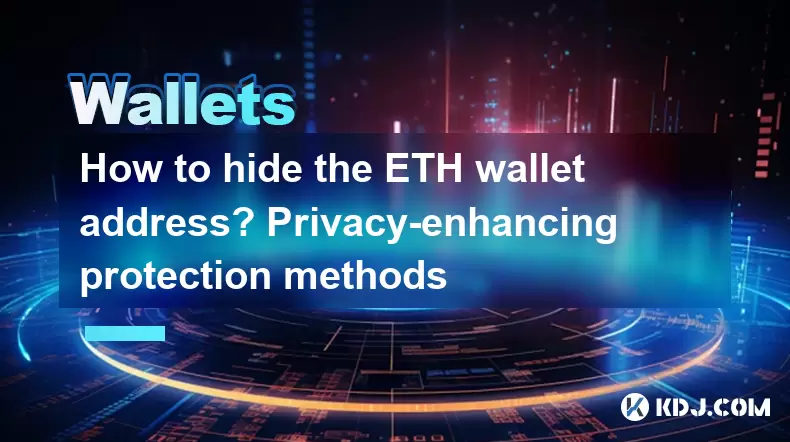
How to hide the ETH wallet address? Privacy-enhancing protection methods
May 13,2025 at 12:28am
Protecting your Ethereum (ETH) wallet address is crucial for maintaining privacy and security within the cryptocurrency space. With the growing concerns over privacy breaches and hacking attempts, it is essential to understand various methods that can help you hide your ETH wallet address effectively. This article will delve into several privacy-enhanci...
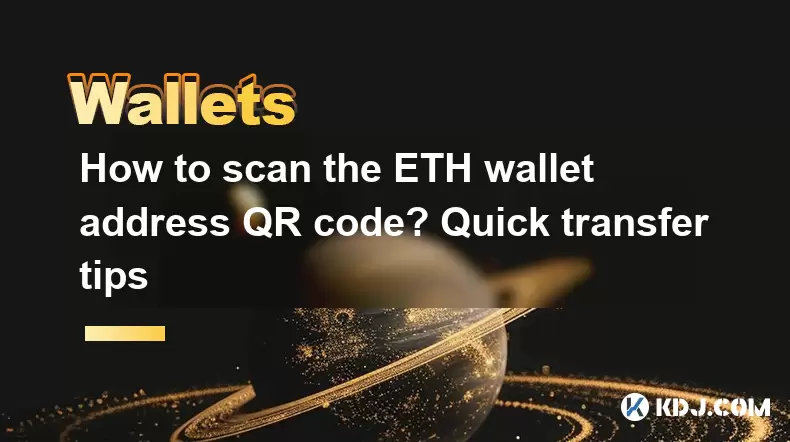
How to scan the ETH wallet address QR code? Quick transfer tips
May 13,2025 at 02:21am
Scanning an Ethereum (ETH) wallet address QR code is a convenient and quick way to initiate transactions. Whether you're sending ETH to a friend or making a purchase, understanding how to properly scan a QR code can streamline your cryptocurrency transfers. This article will guide you through the process step-by-step and provide additional tips for quic...
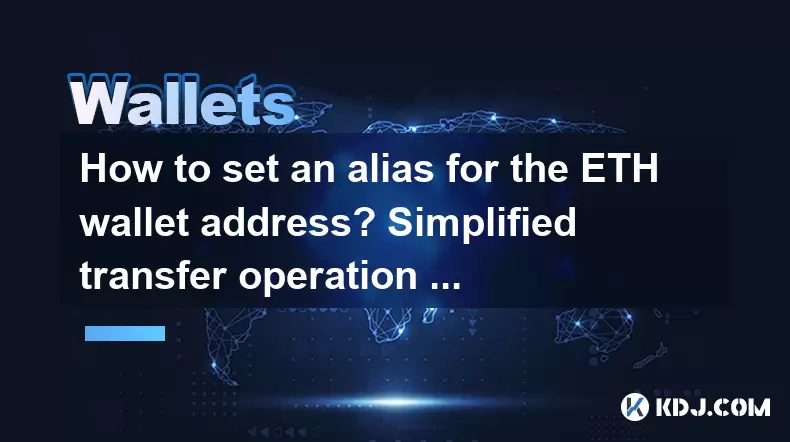
How to set an alias for the ETH wallet address? Simplified transfer operation guide
May 13,2025 at 02:49am
Setting an alias for your Ethereum (ETH) wallet address can significantly simplify the process of sending and receiving cryptocurrencies. An alias serves as a user-friendly name that replaces the long, complex string of characters that make up a typical ETH address. This guide will walk you through the steps to set up an alias for your ETH wallet and pr...
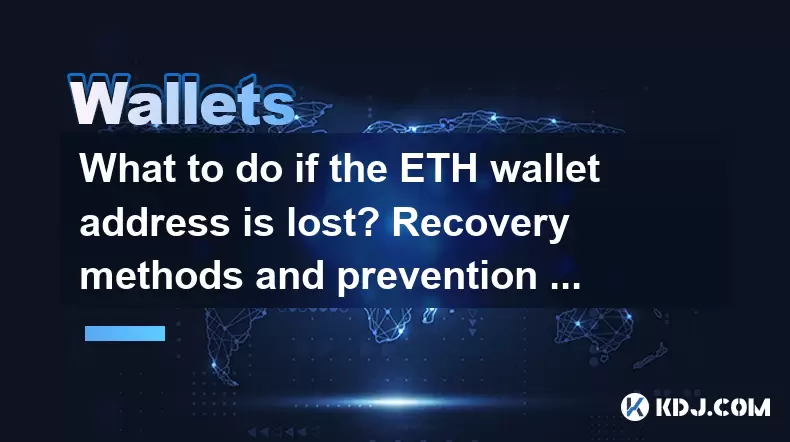
What to do if the ETH wallet address is lost? Recovery methods and prevention suggestions
May 13,2025 at 12:42am
Losing an Ethereum (ETH) wallet address can be a distressing experience, especially if it contains significant funds. However, there are several recovery methods and preventive measures you can take to mitigate the risk and potentially recover your lost wallet. This article will guide you through the steps to recover a lost ETH wallet address and provid...
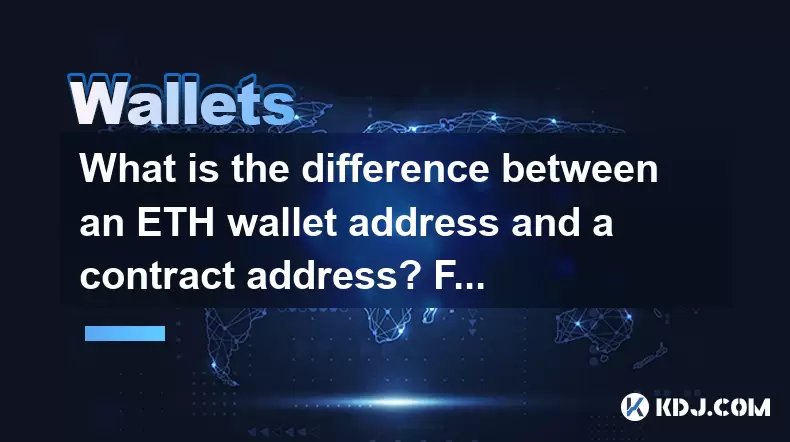
What is the difference between an ETH wallet address and a contract address? Functional comparison
May 13,2025 at 03:42am
The Ethereum blockchain ecosystem comprises various types of addresses, each serving distinct purposes. Understanding the difference between an ETH wallet address and an ETH contract address is crucial for anyone navigating the crypto space. This article delves into the nuances of these addresses, highlighting their functionalities, structures, and use ...
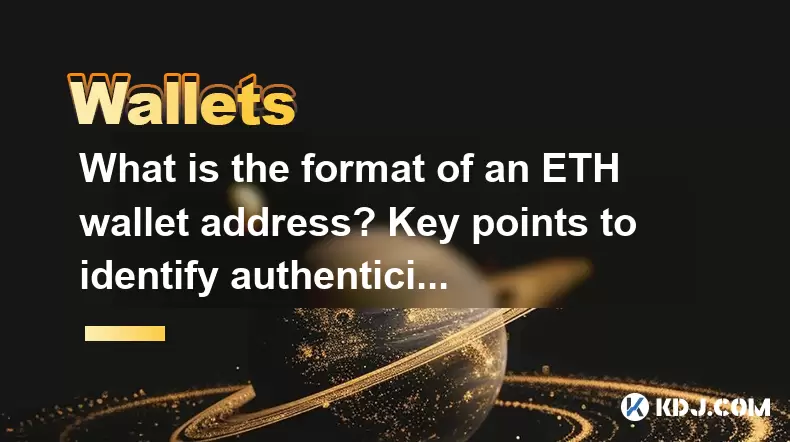
What is the format of an ETH wallet address? Key points to identify authenticity
May 13,2025 at 03:49am
The format of an Ethereum (ETH) wallet address is a crucial aspect of understanding and interacting with the Ethereum blockchain. An ETH wallet address serves as a unique identifier for sending and receiving Ethereum and other tokens on the Ethereum network. Understanding the format and key points to identify authenticity is essential for ensuring secur...

How to hide the ETH wallet address? Privacy-enhancing protection methods
May 13,2025 at 12:28am
Protecting your Ethereum (ETH) wallet address is crucial for maintaining privacy and security within the cryptocurrency space. With the growing concerns over privacy breaches and hacking attempts, it is essential to understand various methods that can help you hide your ETH wallet address effectively. This article will delve into several privacy-enhanci...

How to scan the ETH wallet address QR code? Quick transfer tips
May 13,2025 at 02:21am
Scanning an Ethereum (ETH) wallet address QR code is a convenient and quick way to initiate transactions. Whether you're sending ETH to a friend or making a purchase, understanding how to properly scan a QR code can streamline your cryptocurrency transfers. This article will guide you through the process step-by-step and provide additional tips for quic...

How to set an alias for the ETH wallet address? Simplified transfer operation guide
May 13,2025 at 02:49am
Setting an alias for your Ethereum (ETH) wallet address can significantly simplify the process of sending and receiving cryptocurrencies. An alias serves as a user-friendly name that replaces the long, complex string of characters that make up a typical ETH address. This guide will walk you through the steps to set up an alias for your ETH wallet and pr...

What to do if the ETH wallet address is lost? Recovery methods and prevention suggestions
May 13,2025 at 12:42am
Losing an Ethereum (ETH) wallet address can be a distressing experience, especially if it contains significant funds. However, there are several recovery methods and preventive measures you can take to mitigate the risk and potentially recover your lost wallet. This article will guide you through the steps to recover a lost ETH wallet address and provid...

What is the difference between an ETH wallet address and a contract address? Functional comparison
May 13,2025 at 03:42am
The Ethereum blockchain ecosystem comprises various types of addresses, each serving distinct purposes. Understanding the difference between an ETH wallet address and an ETH contract address is crucial for anyone navigating the crypto space. This article delves into the nuances of these addresses, highlighting their functionalities, structures, and use ...

What is the format of an ETH wallet address? Key points to identify authenticity
May 13,2025 at 03:49am
The format of an Ethereum (ETH) wallet address is a crucial aspect of understanding and interacting with the Ethereum blockchain. An ETH wallet address serves as a unique identifier for sending and receiving Ethereum and other tokens on the Ethereum network. Understanding the format and key points to identify authenticity is essential for ensuring secur...
See all articles






















































































